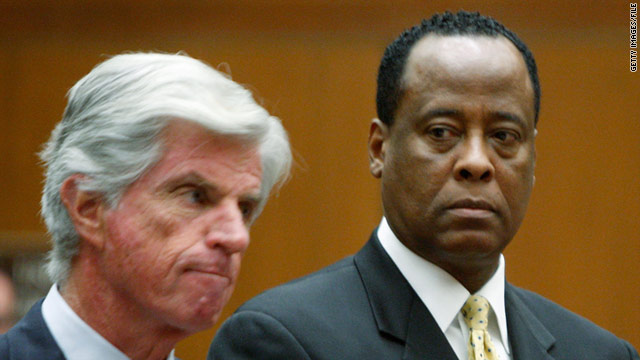Scammer
Banned

Dr. Conrad Murray, right (with defense attorney John Michael Flanagan), said Michael Jackson begged for propofol
-- A sleepless Michael Jackson begged Dr. Conrad Murray for propofol the day he died, the doctor said in a police interview two days after Jackson's death.
Propofol is a surgical anesthetic that the Los Angeles coroner ruled killed Jackson in combination with several sedatives found in the pop star's blood.
While Murray told police he eventually gave Jackson propofol, a defense lawyer planted the seed for a theory Monday that a frustrated Jackson might have poured the fatal dosage into his juice and drank it.
Jackson depended on propofol to put him to sleep almost every night in the previous weeks as he was preparing for his "This Is It" comeback concerts, but Murray began to wean him off the surgical anesthetic two nights earlier, Murray told police.
Los Angeles Police Detective Orlando Martinez testified Monday at the preliminary hearing for Murray's involuntary manslaughter case about what the doctor told him two days after Jackson's death.
Several doses of two sedatives Murray used in place of propofol still hadn't put Jackson to sleep after several hours on the morning of June 25, 2009, Murray told Martinez.
"Mr. Jackson began to complain that he couldn't sleep and that he would have to cancel his rehearsal and cancel his shows if he couldn't get any sleep since he couldn't perform," Martinez quoted Murray as saying.
A civil lawsuit filed last year by Jackson's mother against the company producing the concerts alleged that he had been warned a week earlier "that if Jackson missed any further rehearsals, they were going to 'pull the plug' on the show."
Murray said he eventually gave in to the pressure from his patient and administered a dosage of propofol about 10 a.m., the detective testified. Jackson finally fell asleep, according to Murray's account.
While his patient slept, Murray sent an email to a British insurance agent assuring him that Jackson was in good health, according to another witness Monday.
The agent, who was considering "cancellation insurance" for Jackson's London concerts, raised concerns about media reports about Jackson's health.
"As far as the statement of his health published by the press, let me say they're all malicious to the best of my knowledge," Murray wrote in an email sent from his iPhone at 11:17 a.m. to the agent.
After sending the email, Murray apparently began a series of cell phone calls, including the last conversation with Houston cocktail waitress Sade Anding. She testified Friday that she was on the phone with Murray when he suddenly stopped responding.
That moment, about 11:57 a.m., is when prosecutors contend Murray first realized that Jackson had stopped breathing.
"I didn't hear him on the phone anymore," Anding said. "I heard commotion as if the phone was in a pocket, and I heard coughing, and I heard a mumbling of voices."
Murray told police he returned from using the toilet when he realized Jackson wasn't breathing, Martinez testified.
Earlier witnesses raised doubts about Murray's resuscitation efforts, noting that he was initially using compression techniques while Jackson was still lying on a soft bed. A paramedic testified a patient should be placed on a hard floor.
"Dr. Murray said he could not move him to the floor by himself," Martinez said. The prosecutor pointed out that Murray is 6 feet, 5 inches tall and weighs 220 pounds, while Jackson weighed just 136 pounds when he died.
Prosecutors have criticized Murray for waiting at least 21 minutes before asking a security guard to call 911 for help. Martinez testified that he asked Murray about the delay.
"He said he was caring for his patient, and he did not want to neglect him," Martinez said.
Murray ordered 15.5 liters -- more than four gallons -- of propofol and 80 vials of injectable sedatives from a Las Vegas pharmacy in the three months before Jackson's death, a pharmacist testified.
The drugs were shipped to the Santa Monica, California, apartment where Murray stayed with a girlfriend while he worked as Jackson's personal physician, according to pharmacist Tim Lopez and earlier witnesses.
A Los Angeles coroner's investigator testified Friday about finding empty and unused drug vials near Jackson's bed and in a closet after his death. An empty propofol vial was found on the floor below a nightstand where a juice bottle sat, she said.
Defense lawyer J. Michael Flanigan, in his cross-examination Monday of Los Angeles Coroner Senior Criminalist Jaime Lintemoot, appeared to lay the groundwork for the theory that a frustrated Jackson could have opened a propofol vial, poured it into his juice bottle and then drank it.
Investigators did not test the juice bottle for propofol, Lintemoot said.
The preliminary hearing, which will determine if the case against Murray will go to trial, is not easy at times for Jackson's family to hear.
His mother Katherine, sisters La Toya and Rebe, and brothers Randy and Jackie listened Monday afternoon as Lintemoot described how she prepared Jackson's liver to be tested for drugs.
"We put it in a blender, grind it up, make it into a liquid," she said.
